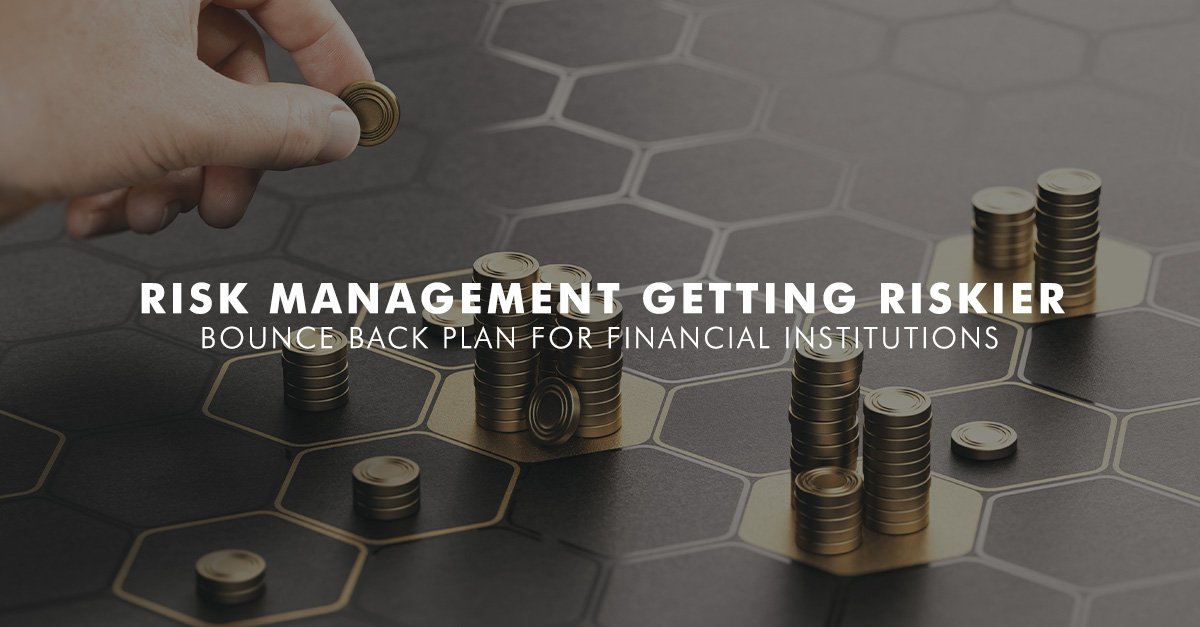
Risk Management Getting Riskier: Bounce Back Plan For Financial Institutions
“Risk management in financial institutions and banks is not only about mitigating the existing risks and combatting the upcoming potential risks; instead, it is about reshaping the entire risk environment by instilling confidence among stakeholders.”
Risk management is an integral part of any organization in any business. Risk management is a process of identifying a risk that may incur to following the steps to monitor and mitigate those risks; be it an existing one or the unprecedented risk with no prior occurrence in the past.
Risks with no prior intimation became the talk of the town with the COVID-19 emergence; which made the world facing risks that were not only new and complicated but unprecedented with no prior knowledge of handling them.
When it comes to financial institutions, the risks are even more significant; with financial institutions having a plethora of regulations to comply with, a massive chunk of data to deal with, and a large number of stakeholders to manage with as well.
Risk Management in Financial Institutions:
Nothing is denying the risk management in financial institutions & banks. And it is also getting riskier due to the emergence of risks that nobody thought of earlier. It happens when an event like a pandemic takes place. This shakes the entire business ecosystem and the overall business practices on the whole.
It presents the world with risks, but at the same time; it also offers the world opportunities to ponder upon by embracing them.
Risk Intelligence:
Managing risks in financial institutions is a little different from managing risks in other organizations in various businesses. Managing risks in financial organizations focuses on leveraging the data, managing cloud computing, and handling the workforce at large.
Factors such as data theft, data leakage, and leakage of sensitive information also play a huge role in managing the risks in financial institutions and banks.
Such factors make the need for risk intelligence come at its core; which focuses on integrating the risks and risk compliance factors by focusing on significant aspects such as getting to know about the potential risks and implementing data compliance, risk compliance, and governance policies.
Cost Factors:
They say everything comes with a cost, and when it comes to banks and other financial institutions; focusing on the cost factors also plays a vital role in leveraging the organizations’ opportunities.
In digital transformation in financial institutions and banks; the cost factors include data architecture costs, third-party integration on payment modes. And it also includes web and online transactions.
Hence, maintaining a proper payment gateway, managing data in software; and enhancing the fintech environment are critical factors that need immediate attention.
Stakeholders At Stake:
People in any organization play a huge role in reshaping it when any disruption takes place. The uncertainties that the COVID-19 pandemic has brought in putting the stakeholders at stake; dealing with risks that occurred out of nowhere.
Stakeholders such as the workforce, the customers, the chief officers such as CEOs, CFO’s and most importantly, CRO’s underwent a surge in their stakes with the rise in responsibility to manage these risks.
According to a recent survey; 41% of financial organizations reported third-party risk management as one of the significant issues stakeholders face.
Bounce Back Plan For Financial Institutions:
When it comes to financial institutions and banks, risk management acts as the utmost priority; going with people’s trust with their portfolios and the hard-earned money involved in the process.
Implementing digital solutions such as online payments and web transactions incur many risks that can hamper the entire organization, let alone the business processes.
Implementing A Risk Management Plan:
Financial institutions and banks are customer-centric organizations, directly dealing with customers, and hence the risks prevail across the business practices and not only to a fixed number of steps.
Having a well-defined risk management plan that identifies, analyses, and evaluates risks and takes the required steps to monitor and mitigate those risks plays a significant role in having a risk aversion environment.
Engaging With Risk And Compliance Bodies:
No financial institution and bank in the world go without addressing the risks and compliance bodies by complying with the regulations they put.
Engaging with risk and compliance governance with a financial institutions’ infrastructure and customer relevance helps mitigate the risks by seeking real-time information; risk metrics, and reporting that provides day-to-day steps and monitors the entire ecosystem.
Winning Stakeholders’ Confidence:
Since many risks might go unaddressed, customers are still vulnerable in adopting the digital payments gateway due to the potential risks.
Therefore, it becomes of utmost importance to analyze these risks and provide much-needed solutions.
To win stakeholders’ confidence by having a stakeholders’ centric plan that focuses on risk and reputation monitoring by addressing the risks such as data architecture, cloud computing threats, data governance risks, and Big data risks, among others, become critical points of focus.
Addressing such risks by inculcating a risk aversion plan that mitigates existing and potential risks wins the stakeholders’ confidence.
Conclusion – Risk Management:
Just like any other industry, financial institutions and banks also face the risk the pandemic presents. These risks become more prevalent when the existing risks and the risks that might occur remains unattended.
A risk management plan, an approach to win stakeholders’ confidence; and engaging with risk and compliance bodies make financial institutions & banks bounce back smoother and mitigate risks efficiently.





